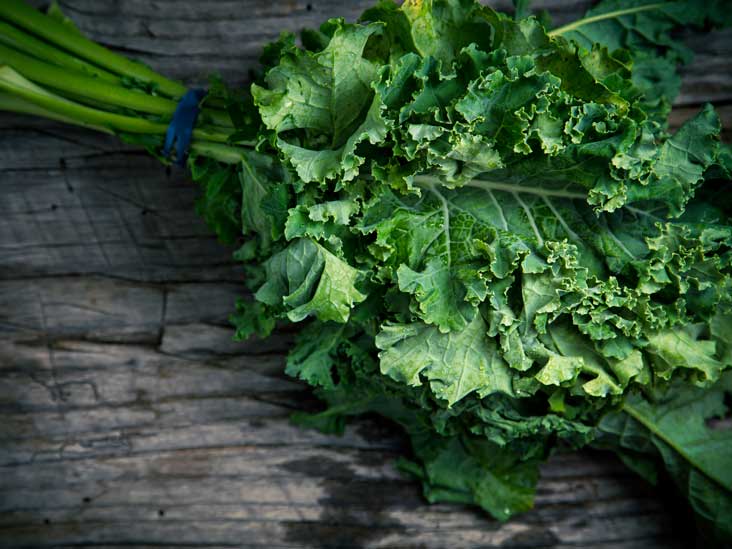With a vibrant kick of kale, spinach, and ripe mango, Love Struck’s Kale Kick ticks all the boxes. It’s packed full of nutrients, juicy, and green, and we think it is best enjoyed in the following ways:

- Tangy and sweet: 100ml water + 100ml of pineapple juice – increase the tropical taste and enhance the vitamin C content while receiving a welcome boost of the enzyme bromelain, which helps your body reduce swelling and combat pain.
- Filling: 200ml of oat milk: This is much creamier than using apple juice and gives you a welcome boost of protein and fibre.
- Refreshing: 200ml of coconut water: There are plenty og awesome health benefits that come from coconut water!
While few people can argue with the benefits of leafy greens such as kale, here are the reasons why they’re so good for us.
Why is kale healthy?
Kale packs a lot of punch when it comes to nutrient density – it has Vitamins A, C, K, and B6 in abundance, as well as multiple minerals, including calcium, copper, manganese, magnesium, and potassium. Pretty impressive!
Kale also packs an impressive amount of powerful antioxidants – notably quercetin and kaempferol – which work to reduce the damage inflicted on your body by free radicals. This is crucial because oxidative damage caused by free radicals in the air is one of the biggest causes of multiple diseases and increases the onset of ageing. The antioxidants found within kale protect your heart, reduce your blood pressure, lower your risk of contracting viruses, and even have anti-depressant and anti-cancer properties – incredible!
Let’s check out the most prevalent vitamins in kale and why they’re influential in helping you maintain good health:
Vitamin K: 684% of your RDA – seriously!
Vitamin A: 206% of your RDA
Vitamin C: 134% of your RDA
Just one cup of kale, which equates to approximately 70g, contains around seven times your recommended daily amount of vitamin K and is of the K1 variety. The reason why Vitamin K1 is so beneficial to your health is that it prevents blood clotting by activating specific proteins and enabling them to carry out their job of binding calcium.
Although kale is widely thought to be high in Vitamin A, it isn’t actually the case. Rather, it contains high levels of beta-carotene, which is an antioxidant that your body then converts into Vitamin A. But why is this helpful? Well, it enables you to see properly, supports your immune system, and helps the natural process of reproduction. Sufficient levels of Vitamin A are also proven to assist the functioning of your lungs, heart, kidneys, and other vital organs.
Do you know what vegetable contains 4.5 times more Vitamin C than spinach and more Vit C than an entire orange? You guessed it – one handful of raw kale! And although most of us understand that Vitamin C does a great job in warding off illness and protecting us from colds and flu, it also contributes significantly to the synthesis of collagen, which is the most abundant structural protein in the human body. Sufficient levels of collagen ensure your skin heals more effectively, which is particularly great for ladies!
What’s more, kale provides a good source of magnesium, which is an important mineral that many of us don’t get sufficient amounts of. Some studies have indicated that magnesium might offer protection against heart disease and type 2 diabetes, and it also has the potential to regulate your sleep patterns. Some of the other benefits of magnesium include the regulation of nerve and muscle function, the maintenance of normal blood sugar levels, and the production of protein, bone, and DNA.
Spinach – different but still super healthy!
With its origins in Persia, spinach is actually a relative to beetroot, chard, and quinoa, as they are all members of a family known as amaranth. If you include sufficient amounts of spinach in your diet, you might see the following benefits:
- Improvement in the health of your eyes
- Cancer prevention
- Reduction in oxidative stress
- Reduction in blood pressure levels
Spinach has high levels of insoluble fibre and is low in carbohydrates, which supports regular bowel movements. Similarly to kale, spinach is also high in carotenoids, which your body then masterfully converts into vitamins A, K, and C. Spinach is also replete with folic acid, which is known more commonly as vitamin B9 or folate, and is an incredibly important compound for pregnant women, whilst also supporting the growth of tissue and maintaining normal levels of cellular function.
With Popeye as our role model, we also know that spinach is a great source of iron. Iron is one of your body’s primary sources of hemoglobin, which takes the oxygen within your red blood cells to your body’s tissues. This makes iron a particularly good supplement for women, who are more at risk of anemia and the subsequent issues that it creates, including low energy and mood as well as feelings of general fatigue.
Another mineral in spinach is calcium, which is crucial for the health of your bones. But it also serves as an essential signalling molecule for your heart, muscles, and nervous system. You will also find the likes of potassium, magnesium, vitamins B6, B9, and E in spinach, securing its place as another superfood!
So, even though you might be thinking that kale and spinach will provide you with a simple mid-morning pick-me-up, it’s doing a lot more than that! It’s actually a powerhouse blend that boosts your heart health, improves your gut, heals your skin, and boosts your blood. Incredible!








